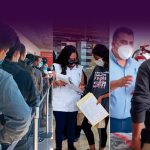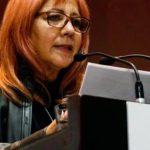Human rights and indigenous languages
- 19 February, 2021
- To preserve, protect and maintain the value of linguistic diversity in the multicultural mosaic of the world.
Framing February 21, the International Mother Language Day, with the objective of preserving, protecting and maintaining this emblematic value of linguistic diversity in the pluricultural mosaic of the world, the president of the CNDH, Rosario Piedra Ibarra, expressed that “with this invariable commitment with our identity and deep roots, the National Human Rights Commission reaffirms its commitment with the defense, promotion and diffusion of the cultural and linguistic rights of the indigenous peoples and communities through the realization of this Virtual Forum called Human Rights and Indigenous Languages, organized by the Fourth General Visitaduria of the CNDH and the Fourth General Visitaduria of the CNDH, which is organized by the Fourth General Visitaduria of the CNDH, promotion and dissemination of cultural and linguistic rights of indigenous peoples and communities through the realization of this Virtual Forum called Human Rights and Indigenous Languages, organized by the Fourth General Inspector’s Office of the CNDH and the objective of this conversation is to reflect and dialogue on one of the fundamental rights of indigenous peoples and communities, which is to preserve and enrich their languages as established in Article 2 of the Constitution.
Let us not forget that Mexico is one of the ten most culturally diverse nations in the international concert with 364 linguistic variants that correspond to 68 groups and 11 Indo-American linguistic families. This commemoration is also the occasion to emphasize that indigenous languages are national languages with the same importance and patrimonial significance as Spanish, for this reason, the new CNDH raises its voice for a true recognition of the rights of speakers of indigenous languages to communicate in their native language and not to be discriminated against.
For this reason, we emphatically demand that indigenous people, organizations and peoples be heard in all public institutions and receive information about social programs, works and services in their native languages, so that the Mexican state recognizes and promotes public communication processes and the activity of indigenous media using their own languages.
We make our own the demand of the indigenous peoples and communities to strengthen intercultural bilingual education throughout the country and we pronounce ourselves to update and enrich the academic plans and programs with the knowledge and cosmovisions of the native peoples, as well as to provide adequate remuneration and dynamic training to the workers of indigenous education in Mexico.
In the framework of this day, the National Human Rights Commission expresses its concern and reaffirms its commitment to prevent the loss of indigenous languages because when an indigenous language becomes extinct, the natural environment of our common history of our identity and national culture is lost, for this powerful reason we endorse and address the Declaration of Chapultepec so that, together government society and indigenous peoples, we build a decade of actions for indigenous languages in the period 2022- 2032.
Let us walk shoulder to shoulder with indigenous peoples and communities to give them a voice, so that public policies, government actions, the media and society in general, make the transformations that contribute to eliminate the practices of structural discrimination that have forced indigenous peoples to self-censor the practice of their languages and opt for Spanish. Let us work together to enforce the international law that recognizes indigenous peoples.
Ladies and Gentlemen: with this conviction and these commitments, at 4:16 p.m. on this Monday, February 22, 2021, I formally declare this Virtual Forum on Human Rights and Indigenous Languages formally inaugurated. We will ensure that the knowledge and experiences that are poured here become powerful shields for the defense of the great cultural mosaic that is derived from our linguistic diversity from our native peoples. We defend the people.



